By Birgit Herbers

Portugal, with its south-western location in Europe, and its 92,000 km2, is one of the sunniest countries in Europe with a solar radiation media of 1,500 kWh/ kWp/year and an average of annual sunshine hours of 2,200-3,000 (see Figure 1 and 2).
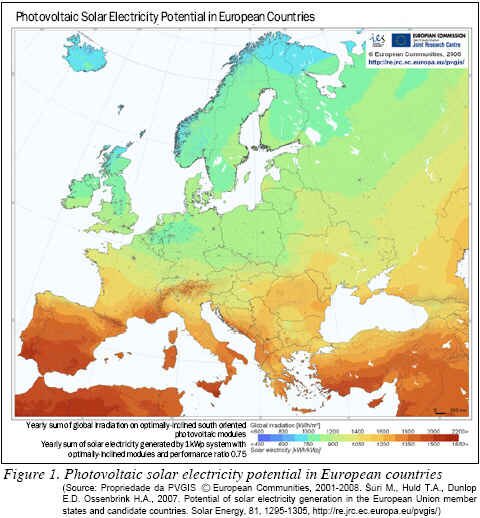
PV Policy and Legislation in Portugal (2001- 2010)
First Grid-Connection Law (DL312/2001)
In Portugal, PV policies only started in 2001, when the first grid connection law was published (DL 312/2001). A different tariff for >5 kWp of about 0.50 /kWh and about 0.38 /kWh for systems of <5 kWp was defined. With a CAP of only 150 MW, licenses became very attractive, especially when 65 MW for the largest PV power plant were granted for the region of Moura in 2002, of which only 46.41 MW were installed until today.
Licenses for PV were not granted after December 2004, which put most of the industry on hold. As for today, 123 MW received licenses, of which until March 2010 a total 108.7 MW (see: Quadro B.2) were installed, including already new licenses for Micro-Generation-Systems (max. capacity 3.68 kWp) under law 363/2007.
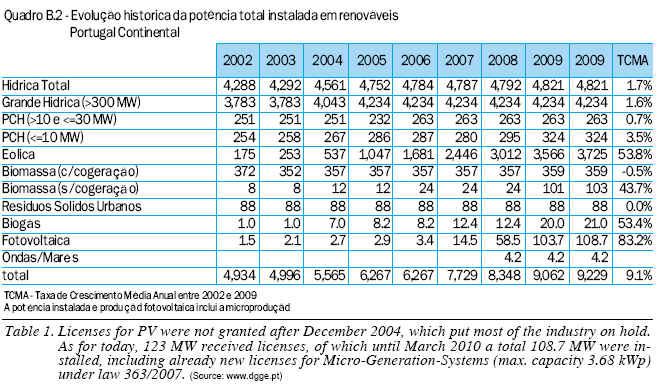
Second Grid-Connection Law (DL363/2007)
With the implementation of the Micro-Generation Law in April 2008, PV installations with FiT regulated tariffs up to 3.68 kWp were licensed through the Internet portal on www.renovaveisnahora.pt. The FiT for PV systems was very attractive (0.65 /kWh). To receive that tariff, owners were obliged to install at least a 2m2 solar warm water system as well. A new PV market chapter was opened, creating hopes for many small and medium companies already involved in solar water heating, to start business in the PV installation sector. The tariff was guaranteed for 5 years (plus installation year) after which it went down to the tariff established at the time, the 5 years were accomplished. The next tariff has not been defined, since each 10 MW installed, the tariff decreased 5%, while the CAP increased 20% each year.
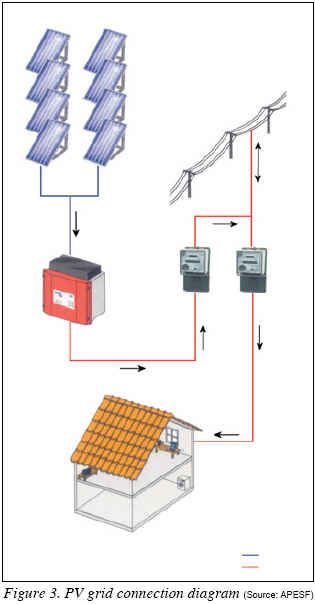 The procedure of online licensing turned out to be very unfair, due to the restricted opening of the portal during a period of an amount of 1.5 MW requests. Each time, the portal opened, a request of 3 MW was accepted within 2 hours, when every interested requester had to make sure, to get the online request. For companies in rural areas without high speed Internet connection, this procedure turned out to be impossible to realize, the server collapsed and did not function with slow Internet lines. After months of trying to get access for requests, many small companies were unable to realize any installation for their customers and were nearly bankrupted. 80% of all small company customers did not get any request for license and 50% of workers were in risk to lose their jobs. The procedure of online licensing turned out to be very unfair, due to the restricted opening of the portal during a period of an amount of 1.5 MW requests. Each time, the portal opened, a request of 3 MW was accepted within 2 hours, when every interested requester had to make sure, to get the online request. For companies in rural areas without high speed Internet connection, this procedure turned out to be impossible to realize, the server collapsed and did not function with slow Internet lines. After months of trying to get access for requests, many small companies were unable to realize any installation for their customers and were nearly bankrupted. 80% of all small company customers did not get any request for license and 50% of workers were in risk to lose their jobs.
This situation finally ended, when an automatic request for all customers already signed in was implemented in February 2010. Statistics of April 23, 2010 show FIT distribution as followed:
-2008/04 until 2009/02: 10.782 MW with 0.65 /kWh installed
-2009/04 until 2009/12: 12.744 MW with 0.6175/kWh installed
-2010/02/17: 8 MW with 0.5866/kWh requests
-2010/02/18: 4.1 MW with 0.5573/kWh requests
The statistic distribution of MG-Law can be consulted at http://www.renovaveisnahora.pt/web/srm/30. No actual statistics exist, whether if or how the last FiTs apply for all requests of the increased CAP of 14.4 MW in 2010.
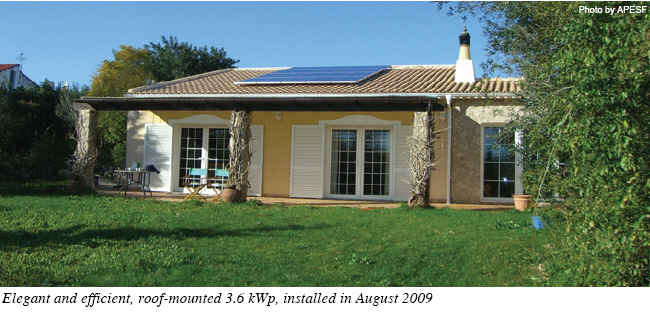
PV Power Market Landscape/Prospect in Portugal (2010 - 2020)
New Draft on Micro-Generation Grid Connection (June 2010)
For the beginning of September 2010, Portugal expects the new law for Micro-Generation. All small-scale renewable energy sources, including PV, wind, hydro and biomass, receive a CAP of 250 MW until 2020. New FiTs have been under public consultancy and indicate the following scenario:
Only systems up to 3.68 kWp with installed 2m2 solar water systems or biomass heating (pellets) receive the benefit tariff of 0.40 /kWh for a duration of 8 years, followed by 7 years of 0.24 /kWh. CAP will be risen to 20 MW per year and increase 5%, while tariff decreases 0.02 /kWh.
The certification for technical components will be defined by system number 5 of ISO/IEC. Restrictions are:
-Each consumption point can only have 1 production system.
-A maximum of 50% of the consumption power is allowed to install for production capacity.
-After connected 25% of the medium voltage transformer capacity, no more licenses for this area will be admitted.
The online registration request procedure will be as followed:
1. Register for username and password.
2. Fill in request for MG license (implicates all related data on tax number, electric consumption contract values.
3. Pay 500 fee (still unconfirmed value) for license validation.
4. Reception of payment confirmation and provisory license.
5. 120 days after request, inspection for grid connection must be required.
APESF is pleased to confirm that most of the items we suggested on public consultancy for better application on registration difficulties were accepted and integrated into the renewed version of the Micro-Generation-Law. Especially the first-in first-out principle, that easies the way to licensing also for small or medium companies and low Internet connection speed, was one fundamental issue on our critics for a better solution.
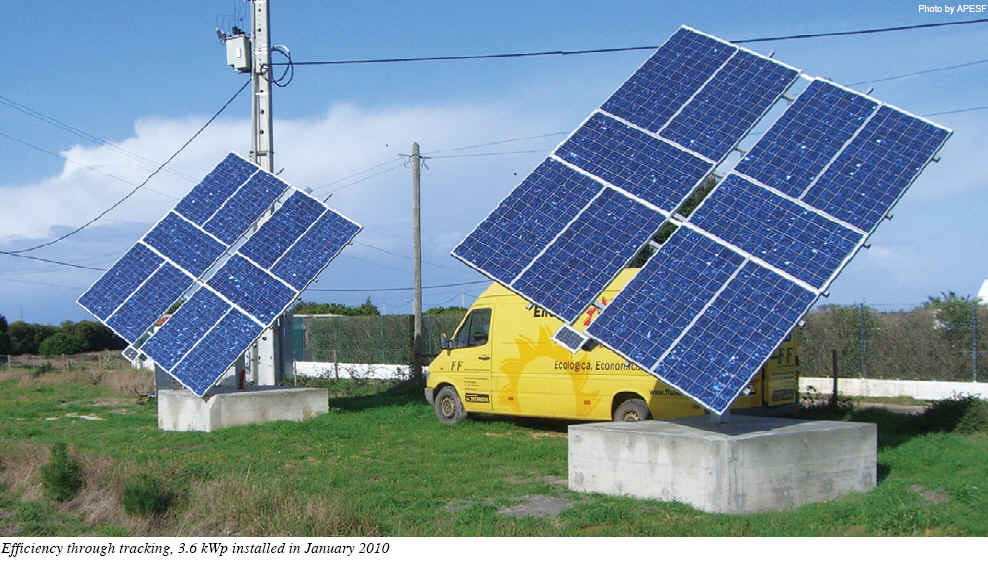
New Draft on Mini-Generation Grid Connection (due in September 2010)
The latest Council of Ministers approved on July 8, 2010 not only the new Micro-Generation Law, but also informed about preparations for further licenses under a so-called Mini-Generation-Law for solar power plants up to 150 kWp for PV technology and up to 250 kWp for other technologies, such as concentrator panels or concentrated solar-thermo-electric systems. A draft planned for Mini-Generation will be sent to the associations as well as other stakeholders for public consultancy in September 2010 (at the moment this article was written).
Therefore, we expect another impulse for PV and other innovative solar electricity production systems. A special part of the whole of 1,000 MW for solar systems to be installed until 2020 will be dedicated to public buildings (schools, markets, municipal swim and sports facilities, etc.), as well as to social institutions.
PV Financial/Investment Opportunity in Portugal
The Roadmap for Renewable Energy Strategies has been under public consultancy in July and will be delivered to the European Commission. It is a binding document for introducing renewable strategies on the national markets. Portuguese politicians pretend to implement 1 GWp solar systems for electricity generation until 2010. In relation to Germany, with half of the medium sunshine hours, Portugal will install within the next 10 years only 15% of Germany’s yearly installed capacity. This is obviously not a visionary politics for PV developments. Most emphasis is given to large wind and hydro plants, due to strong lobby work in the past 10 years.
Only 2 years ago the APESF (Portuguese PV Industry Association) was founded, where also international companies with interest to get access to the Portuguese market are accepted. APESF is concentrating since then, to get in contact and conversation with policy decision-makers. All recently published new laws under public consultancy were answered by APESF and the development of the new rules to access Micro-Generation licenses shows almost 100% of acceptance of APESF suggestions.
We believe that Portugal, with its high solar exposure can and will develop to a future high potential PV market for decentralized PV installations. Opportunities for manufactures are good, given that only two solar panel assemblers exist until now. Salaries and taxes are considerably low, related to the medium salary in the European Union. Portuguese workers are acknowledged as hardworking and loyal employees. Therefore, Portugal facilitates good opportunities and access to the European market, as well as to a large number of Portuguese speaking emerging countries, such as Brazil, Angola, Mozambique, Cap Verde, etc.
As a participating country in the 2008 implemented Mediterranean Solar Plan (see http://www.mediterraneansolarplan-conference.es//index.php/idmenu.1034), Portugal has another opportunity to increase its role in the PV industry.
Birgit Herbers is a foundation member and General Secretary for APESF (http://www.apesf.pt/).
For more information, please send your e-mails to pved@infothe.com.
ⓒ2010 www.interpv.net All rights reserved.
|



